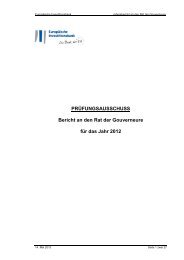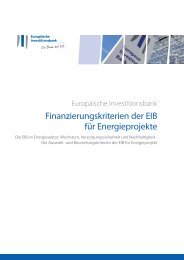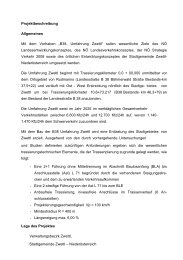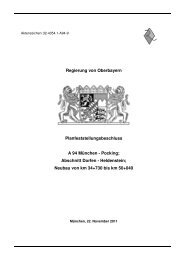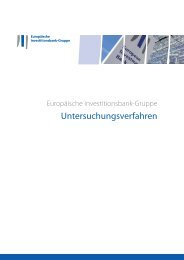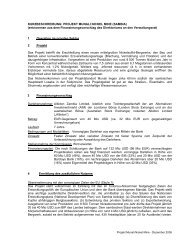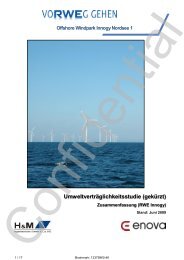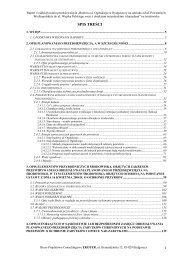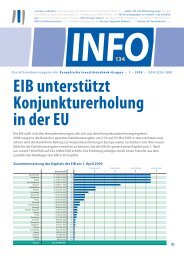EIB Papers Volume 13. n°1/2008 - European Investment Bank
EIB Papers Volume 13. n°1/2008 - European Investment Bank
EIB Papers Volume 13. n°1/2008 - European Investment Bank
You also want an ePaper? Increase the reach of your titles
YUMPU automatically turns print PDFs into web optimized ePapers that Google loves.
High GDP growth in<br />
the new member states<br />
has been driven by<br />
investment but even<br />
more by productivity<br />
gains.<br />
116 <strong>Volume</strong>13 N°1 <strong>2008</strong> <strong>EIB</strong> PAPERS<br />
while PPPs provide a promising route for channelling more resources into infrastructure investment,<br />
strengthening the institutional framework for PPPs and limiting incentives to simply move<br />
investment off budget is crucial to deliver on the expected benefits and manage the associated<br />
fiscal risks.<br />
The rest of the paper is organized as follows. Section 2 reviews the implications for fiscal policy of<br />
efforts to enhance growth and macroeconomic stability. Section 3 analyzes fiscal developments in<br />
NMS and the role of public investment in fiscal adjustment episodes. Section 4 discusses the state<br />
of infrastructure in NMS. Section 5 focuses on the potential role of new mechanisms for financing<br />
infrastructure, particularly increased EU support following EU membership and PPPs. Section 6<br />
concludes.<br />
2. Economic growth and stability: The role of fiscal policies<br />
Mostly driven by productivity growth and investment, growth in the NMS has been high but<br />
uneven. In general, the Baltics achieved much higher growth rates than Central and Eastern<br />
<strong>European</strong> countries (CEEs). As shown in Figure 1, productivity growth was a key engine for economic<br />
growth, with a contribution of almost double that of East Asian emerging market comparators<br />
(Schadler et al. 2007). This reflected economic reforms that addressed large inefficiencies inherited<br />
from central planning. Capital accumulation also played a substantial role in supporting growth. In<br />
contrast, employment contributed little, likely associated with significant labour shedding during<br />
the transition.<br />
Foreign savings were instrumental to financing investment. National savings have been relatively<br />
low in the NMS, with only the Czech Republic, Slovenia, and Estonia achieving rates above 20 percent<br />
of GDP. However, due to ample availability of foreign financing – which contributed between 9 and<br />
38 percent of gross investment in the NMS – low national savings have not held back investment<br />
(Figure 2). The resulting total investment rates of about 24 percent of GDP in the CEEs and 30 percent<br />
of GDP in the Baltics are comparable to those observed in other fast growing emerging markets.<br />
<strong>European</strong> integration has likely facilitated such increased use of foreign capital.<br />
Looking ahead, continued capital inflows and increased national savings – both needed to<br />
sustain and strengthen investment and growth – will require sound fiscal policies. 3 In most<br />
NMS, strengthening fiscal sustainability will require further efforts at expenditure- based fiscal<br />
consolidation, considering high initial expenditure levels. In this regard, Alesina et al. (2002) find<br />
that lower public spending can reduce labour costs and raise profits and private investment. Fiscal<br />
consolidation can also reduce the borrowing cost for the private sector to access international<br />
capital markets through reduced country risk. IMF (2005) reports that countries with lower public<br />
debt receive higher sovereign bond ratings, and Akitoby and Stratmann (2006) find that spending<br />
cuts, particularly cuts in current expenditure, are associated with lower sovereign bond spreads.<br />
Strong fiscal policies are also needed to safeguard overall macroeconomic stability. As in many<br />
fast-growing economies, there is evidence of some build-up of macroeconomic vulnerabilities<br />
in the NMS (Figure 3). Current account deficits are high in several NMS (the Baltics and Hungary),<br />
3 Although Ricardian equivalence theory suggests that private saving may adjust to fully offset changes in public saving, the<br />
empirical literature on developing countries only finds small Ricardian effects, which, among other things, may reflect less<br />
developed financial markets and the associated market perceptions on public sector governance and country risks. See<br />
Feldman and Watson (2002) for details.




